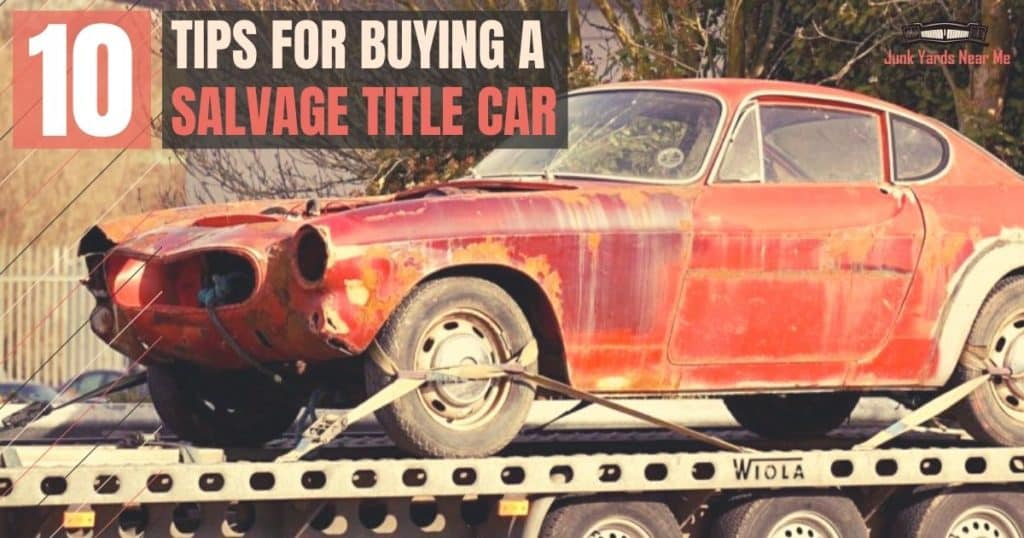
You’ve probably looked at some vehicles on line and thought whoa this high end car is so cheap. Then you see the dreaded words “Salvage Title”. Is is bad too buy a salvage title car?…it depends. Below we will discuss how to determine if buying a car with a salvage title car is worth it.
First, lets be clear on what a salvage title is…
What is a Salvage Title?
A salvage title refers to a vehicle that cannot be driven, in its current condition. A salvaged car may have been damaged, stolen, or in an accident. When the expenses to repair the vehicle are higher than its value, the insurance provider will write off the car, and claim possession. There is a more detailed wiki page here on the topic.
Tips for Buying a Car With a Salvage Title
1 . Consider the Level of Damage
It’s possible to purchase salvaged cars, for incredibly cheap prices. Once you’ve purchased a salvaged car, you can conduct the repairs, until the car is fit for use. Alternatively, you might salvage some of the automotive parts, (instead of the whole vehicle). Using this process, it’s possible to make or save money if you use it like a parts car.
First, though, you’ve got to assess the level of damage. If a salvaged car is damaged too severely, it may not be worth your money and time! You really need to inspect these vehicles; was there flood damage? an accident on the front end? etc…
2. Consider the Salvage Title Letter Grade
To help you assess the level of damage, ask the insurance company to provide you with the salvage title of the car. These titles can help you to judge what state the car is in, and therefore if the deal is worth it.
- Title A: An ‘A’ classification is given to cars that are severely damaged and only useful for scrap.
- Title B: There has been extensive damage, the vehicle cannot be repaired, yet some parts can be salvaged.
- Title C: The title C means the vehicle can be repaired, but it will be more expensive than what the vehicle is worth.
- Title D: These vehicles can be repaired, yet with significant costs, however, the costs do not exceed the value.
Imaginably, title D cars are what you should be looking for if you’re considering buying a salvage title car.
4. The Price Tag
When you’re buying a salvaged car, you need to consider the price tag, figure out how much the repairs will be, and how much you can potentially sell the vehicle for. Before you purchase a car you’ll want to have an approximate idea of how much the repairs will cost.
According to Kelly Blue Book: salvaged cars are estimated to be worth between 20% and 40% of second-hand vehicle value. In most cases, you’ll then receive approximately 60% on the value of the non damaged parts. All in all, you’ll need to calculate how much you can make, to determine if your efforts will be worth it.
4. Think About the Extra Costs
When you’re buying a salvage title car you’ve got to think about the extra costs, as well as the repairs. These costs will include a warranty and registration. It’s also pretty likely that a salvage dealer will ask for a cash-only purchase.
Once you’ve finished repairing a salvage vehicle, you’ll need to prove that the vehicle is fit to drive and apply for a rebuilt title. Doing so can involve extra costs, from the inspection to obtaining insurance and vehicle registration. According to Value Penguin: 20-30% of insurance companies won’t insure a vehicle that had a salvage title previously. That means you have less options for insurance and may have to settle for higher premiums.
5. What Stage is the Salvage Vehicle In?
Putting it simply there are two kinds of salvage vehicles ones that need repairs and ones that have been repaired already The latter option comes with less hassle and risk! When the work has been completed it’s likely that the car has been assessed and licensed.
Salvage vehicles are cheaper for purchase before the repairs have been completed. However, you must ensure that the repairs are conducted to the correct standards. That is the reason you need to get it certified by a mechanic to get a rebuilt title. Remember, you are liable for damages caused by the car if it ends up on the roads before it’s ready. To keep yourself and others safe, everything must be above board.

Repairable Salvage Ferrari F1 360 Spider Modena
6. Inspection Before Purchase
Before you buy a salvaged title car you should take the car to a repair shop, and ask them to perform an inspection. The repair shop should be separate from the dealership you are purchasing from, (this will ensure that you get an unbiased opinion). An inspection can help you to determine:
- The extent of repairs that the salvage vehicle needs.
- How much the repairs are likely to cost.
- An estimated resale price once the vehicle is repaired.
- An inspection may highlight extra damages, (meaning you can apply for a further discount with the dealership).
Here is where it helps if you can truly inspect the vehicle yourself or have a mechanic friend. Since you can’t drive a salvage title vehicle legally, taking it to a mechanic often means towing it and paying for that as well.
Here is a good video to help you do an inspection:
7. After Purchase Inspection for Rebuilt Title
Once you’ve repaired the car you’ll need to have an auto inspection, to license the car. These inspections are usually conducted by either the police or rebuilt auto shops. Depending on your state, the rules for obtaining a rebuilt title will vary. There are other things to consider as well before you can get rebuilt title insurance.
8. Choose a Reputable Dealership
When you are buying a salvaged car it’s important to buy from a reputable dealership. To find a reputable dealership, take a good look at the website and search for online reviews. Call them up and ask for details of their credentials.
It can be helpful to write up a list of questions before you call. The industry of salvaged vehicles can come with a lot of risk, so it’s important to trust the dealership you are purchasing from.
While you can save money purchasing a salvage vehicle from a private owner, you should be a seasoned mechanic if you are going to do so.
9. Theft Recovery Vehicles
When a stolen vehicle is recovered, the insurance company writes off the car. This doesn’t happen immediately, but usually after about 30 days. The vehicle is titled as ‘salvaged’, but sometimes these vehicles are found with no damages. Many buyers are interested in theft recovery vehicles, as you can end up getting a car that’s in good condition, for an excellent price.
10. Get as Many Facts as You Can
When you’re buying a salvaged car, you should learn as much about its history as you possibly can. Purchasing salvaged titles isn’t as straightforward as buying regular used cars, but in both cases, you need to ensure you know exactly what you’re getting.
Ask your dealership for documents about the previous owners, details of the accident, insurance company payouts, and so on. Learning more about the car may put you off the sale, or you might find that everything is to your liking. Either way, it’s important to get all the facts.
